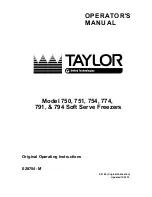
6
Weggooien
Informatie over de verpakking van het apparaat
Alle gebruikte grondstoffen zijn milieuvriendelijk! Ze kunnen zonder gevaar
weggegooid of in de vuilverbrandingsoven verbrand worden!
De grondstoffen: de kunststoffen kunnen ook opnieuw gebruikt worden en
worden als volgt gekarakteriseerd:
>PE< voor polyethyleen, bijv. bij de buitenste verpakking en de zakken bin-
nenin.
>PS< voor schuimpolystyrol, bijv. bij de bekledingsdelen, in principe CFK-
vrij.
De kartonnen delen zijn van oud papier gemaakt en kunnen ook weer bij
het oud-papier gedaan worden.
Weggooien van oude apparaten
Wegens milieuredenen dienen koelapparaten vakkundig ontmanteld te
worden. Dit geldt voor uw huidige apparaat en - als het ook aan vervanging
toe is - ook voor uw nieuwe apparaat.
Waarschuwing! Apparaten die hun tijd gehad hebben onbruikbaar maken
voordat ze weggegooid worden. Stekker er afhalen, netsnoer doorknippen,
eventuele snap- of grendelsloten verwijderen of kapotmaken. Hierdoor
wordt voorkomen dat spelende kinderen in het apparaat opgesloten wor-
den (verstikkingsgevaar!) of in andere levensgevaarlijke situaties terechtko-
men.
Aanwijzingen voor het weggooien:
• Het apparaat mag niet bij het huis- of grofvuil gezet worden.
• Het koelvloeistofcircuit, in het bijzonder de warmtewisselaar aan de ach-
terkant, mag niet beschadigd worden.
• Informatie over afhaaltijden of inzamelplaatsen zijn te verkrijgen bij de
plaatselijke reinigingsdienst of op het gemeentehuis.
Transportbescherming verwijderen
Het apparaat alsmede de onderdelen van het interieur zijn voor het tran-
sport beschermd.
• Alle plakband alsmede bekledingsdelen uit het interieur verwijderen.
31
Cleaning and Care
For hygienic reasons the appliance interior, including interior accessories,
should be cleaned regularly.
Warning!
• The appliance may not be connected to the mains during cleaning. Danger
of electrical shock! Before cleaning switch the appliance offand rem ve the
plug from the mains, or switch off or turn out the circuit breaker or fuse.
• Never clean the appliance with a steam cleaner. Moisture could accumu-
late in electrical components, danger of electrical shock! Hot vapours can
lead to the damage of plastic parts.
• The appliance must be dry before it is placed back into service.
Attention!
• Ethereal oils and organic solvents can attack plastic parts, e.g.
– lemon juice or the juice from orange peals;
– butyric acid;
– cleansers which contain acetic acid.
Do not allow such substances to come into contact with appliance parts.
• Do not use any abrasive cleansers.
1.
Remove frozen food and the food from the refrigerator. Wrap frozen food
in several layers of newspaper. Store it in a cool place, well covered.
D068
4.
Insert the plastic scraper into the
recess provided under the defrost
water channel and place a collecting
basin under it.
5.
Once defrosting is completed keep
the scraper for future use;
6.
Turn the thermostat knob to the
required setting or replace the plug
in the power socket.
Warning!
Never use metal tools to scrape off
the frost
Do not use a mechanical device or any artificial means to speed up the
thawing process other than those recommended by the manufacturer.
A temperature rise of the frozen food packs, during defrosting , may shor-
ten their safe storage life.




































